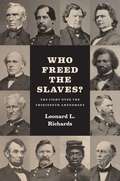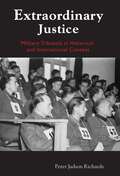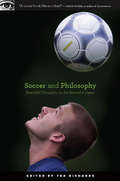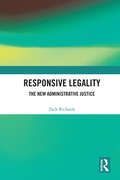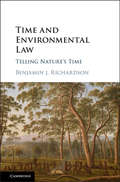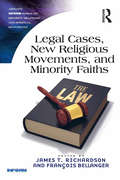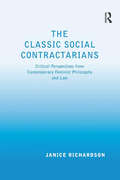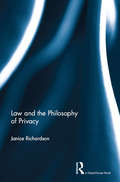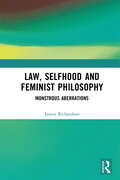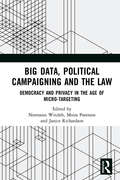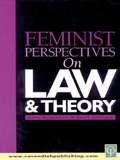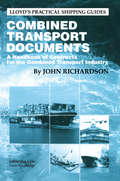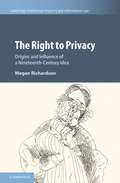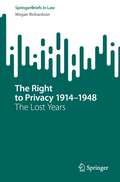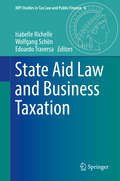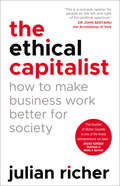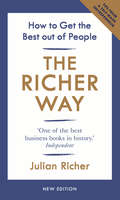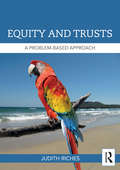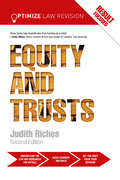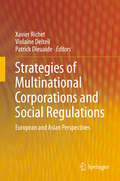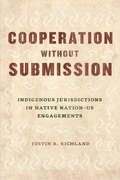- Table View
- List View
Human Nature After Darwin: A Philosophical Introduction
by Janet Radcliffe RichardsHuman Nature After Darwin is an original investigation of the implications of Darwinism for our understanding of ourselves and our situation. It casts new light on current Darwinian controversies, also providing an introduction to philosophical reasoning and a range of philosophical problems.Janet Radcliffe Richards claims that many current battles about Darwinism are based on mistaken assumptions about the implications of the rival views. Her analysis of these implications provides a much-needed guide to the fundamentals of Darwinism and the so-called Darwin wars, as well as providing a set of philosophical techniques relevant to wide areas of moral and political debate.The lucid presentation makes the book an ideal introduction to both philosophy and Darwinism as well as a substantive contribution to topics of intense current controversy. It will be of interest to students of philosophy, science and the social sciences, and critical thinking.
Who Freed the Slaves?: The Fight over the Thirteenth Amendment
by Leonard L. RichardsIn the popular imagination, slavery in the United States ended with Abraham Lincoln’s Emancipation Proclamation. The Proclamation may have been limited--freeing only slaves within Confederate states who were able to make their way to Union lines--but it is nonetheless generally seen as the key moment, with Lincoln’s leadership setting into motion a train of inevitable events that culminated in the passage of an outright ban: the Thirteenth Amendment. The real story, however, is much more complicated--and dramatic--than that. With Who Freed the Slaves?, distinguished historian Leonard L. Richards tells the little-known story of the battle over the Thirteenth Amendment, and of James Ashley, the unsung Ohio congressman who proposed the amendment and steered it to passage. Taking readers to the floor of Congress and the back rooms where deals were made, Richards brings to life the messy process of legislation--a process made all the more complicated by the bloody war and the deep-rooted fear of black emancipation. We watch as Ashley proposes, fine-tunes, and pushes the amendment even as Lincoln drags his feet, only coming aboard and providing crucial support at the last minute. Even as emancipation became the law of the land, Richards shows, its opponents were already regrouping, beginning what would become a decades-long--and largely successful--fight to limit the amendment’s impact. Who Freed the Slaves? is a masterwork of American history, presenting a surprising, nuanced portrayal of a crucial moment for the nation, one whose effects are still being felt today.
Extraordinary Justice: Military Tribunals in Historical and International Context
by Peter Judson RichardsThe Al-Qaeda terror attacks of September 11, 2001, aroused a number of extraordinary counter measures in response, including an executive order authorizing the creation of military tribunals or "commissions" for the trial of accused terrorists. The Supreme Court has weighed in on the topic with some controversial and deeply divided decisions, most recently Hamdan v. Rumsfeld. At this critical moment in time, Extraordinary Justice seeks to fill an important gap in our understanding of what military tribunals are, how they function, and how successful they are in administering justice by placing them in comparative and historical context. Peter Judson Richards examines tribunals in four modern conflicts: the American Civil War, the British experience in the Boer War, the French tribunals of the "Great War," and Allied practices during the Second World War.Richards also examines the larger context of specific political, legal and military concerns, addressing scholarly and policy debates that continually arise in connection with the implementation of these extraordinary measures. He concludes that while the record of the national tribunals has been mixed, enduring elements in the character of warfare, of justice, and the nature of political reality together justify their continued use in certain situations.
Soccer and Philosophy
by Ted RichardsThis collection of incisive articles gives a leading team of international philosophers a free kick toward exploring the complex and often hidden contours of the world of soccer. What does it really mean to be a fan (and why should we count Aristotle as one)? Why do great players such as Cristiano Ronaldo count as great artists (up there alongside Picasso, one author argues)? From the ethics of refereeing to the metaphysics of bent (like Beckham) space-time, this book shows soccer fans and philosophy buffs alike new ways to appreciate and understand the world's favorite sport.
Responsive Legality: The New Administrative Justice
by Zach RichardsResponsive Legality is an important book about twenty first century justice. It explores the legal and moral values that twenty-first-century public officials use to make their decisions, engaging existing theoretical models of administrative justice and updating them to reflect changed twenty-first-century conditions. Together, these features of twenty-first century public administration are coined ‘responsive legality’. Whereas twentieth-century public officials were generally driven by their concern for bureaucratic rationality, professional treatment, moral judgement and – towards the end of the century – the logics of ‘new managerialism’, the twenty-first-century public official embodies greater complexity in their characteristic pursuit of substantive and procedural justice. In responsive legality, government decision makers show a distinct concern for the protective parameters of the rule of law, a purposive pursuit of fair outcomes and a commitment to flexible decision making.
Fiduciary Law and Responsible Investing: In Nature’s trust (Routledge Research in Finance and Banking Law)
by Benjamin J. RichardsonThis book is about fiduciary law’s influence on the financial economy’s environmental performance, focusing on how the law affects responsible investing and considering possible legal reforms to shift financial markets closer towards sustainability. Fiduciary law governs how trustees, fund managers or other custodians administer the investment portfolios owned by beneficiaries. Written for a diverse audience, not just legal scholars, the book examines in a multi-jurisdictional context an array of philosophical, institutional and economic issues that have shaped the movement for responsible investing and its legal framework. Fiduciary law has acquired greater influence in the financial economy in tandem with the extraordinary recent growth of institutional funds such as pension plans and insurance company portfolios. While the fiduciary prejudice against responsible investing has somewhat waned in recent years, owing mainly to reinterpretations of fiduciary and trust law, significant barriers remain. This book advances the notion of ‘nature’s trust’ to metaphorically signal how fiduciary responsibility should accommodate society’s dependence on long-term environmental well-being. Financial institutions, managing vast investment portfolios on behalf of millions of beneficiaries, should manage those investments with regard to the broader social interest in sustaining ecological health. Even for their own financial self-interest, investors over the long-term should benefit from maintaining nature’s capital. We should expect everyone to act in nature’s trust, from individual funds to market regulators. The ancient public trust doctrine could be refashioned for stimulating this change, and sovereign wealth funds should take the lead in pioneering best practices for environmentally responsible investing.
Time and Environmental Law: Telling Nature's Time
by Richardson Benjamin J.Disciplined by industrial clock time, modern life distances people from nature's biorhythms such as its ecological, evolutionary, and climatic processes. The law is complicit in numerous ways. It compresses time through 'fast-track' legislation and accelerated resource exploitation. It suffers from temporal inertia, such as 'grandfathering' existing activities that limits the law's responsiveness to changing circumstances. Insouciance about past ecological damage, and neglect of its restoration, are equally serious temporal flaws: we cannot live sustainably while Earth remains degraded and unrepaired. Applying international and interdisciplinary perspectives on these issues, Time and Environmental Law explores how to align law with the ecological 'timescape' and enable humankind to 'tell nature's time'. Lending insight into environmental behaviour and impacts, this book pioneers a new understanding of environmental law for all societies, and makes recommendations for its reform. Minding nature, not the clock, requires regenerating Earth, adapting to its changes, and living more slowly.
Legal Cases, New Religious Movements, and Minority Faiths (Routledge Inform Series on Minority Religions and Spiritual Movements)
by James T. Richardson François BellangerNew religious movements (NRMs) and other minority faiths have regularly been the focus of legal cases around the world in recent decades. This is the first book to focus on important aspects of the relationship of smaller faiths to the societies in which they function by using specific legal cases to examine social control efforts. The legal cases involve group leaders, a groups’ practices or alleged abuses against members and children in the group, legal actions brought by former members or third parties, attacks against such groups by outsiders including even governments, and libel and slander actions brought by religious groups as they seek to defend themselves. These cases are sometimes milestones in the relation between state authorities and religious groups. Exploring cases in different parts of the world, and assessing the events causing such cases and their consequences, this book offers a practical insight for understanding the relations of NRMs and other minority religions and the law from the perspective of legal cases. Chapters focus on legal, political, and social implications. Including contributions from scholars, legal practitioners, actual or former members, and authorities involved in such cases from various jurisdictions, this book presents an objective approach to understanding why so many legal actions have involved NRMs and other minority faiths in recent years in western societies, and the consequences of those actions for the society and the religious group as well.
The Classic Social Contractarians: Critical Perspectives from Contemporary Feminist Philosophy and Law
by Janice RichardsonHow can we live together without subordination and oppression? What does it mean to treat each other as free and equal persons? This book uses contemporary feminist insights to examine aspects of the classic social contractarians' arguments, focusing specifically upon the work of Hobbes, Spinoza, Locke, Rousseau and Kant. Considering the relationship between the 'self' and the law, this volume also looks at the points at issue between feminist political theorists and considers the usefulness of contractarian arguments for feminist politics today, together with an examination of the relationship between their political, legal and moral analyses.
Law and the Philosophy of Privacy
by Janice RichardsonSituating privacy within the context of political philosophy, this book highlights the way in which struggles concerning the meaning of privacy have always been political. Different conceptions of privacy are here shown to involve diverse assumptions about ontology: our conceptions of self, culture, society and communication. Privacy theory’s debt to Locke, Kant or Mill, and what is at stake in their conceptual frameworks, is examined. The extent to which the term "privacy" has been used to the detriment of - and to create - weaker parties in marriage, in the workplace and now as citizens (or non-citizens) and consumers, as well as employees, is also demonstrated. In contrast, Janice Richardson pursues the relevance of Floridi’s philosophy of information, before turning to her application of Spinoza, the philosopher of communication, in order to outline a more useful framework through which to think about privacy today. The book will be of interest to those working in political philosophy, feminist philosophy, law, the philosophy of information, sociology, media, and cultural studies.
Law, Selfhood and Feminist Philosophy: Monstrous Aberrations
by Janice RichardsonAt the intersection of law, feminism and philosophy, this book analyses the ways in which certain bodies and ‘selves’ continue to be treated as monstrous aberrations from the ‘ideal’ figure or norm. Employing contemporary feminist philosophy to rethink accepted legal ideas, the book is divided into three sections. The first focuses on the different relational ontologies of philosophers Adriana Cavarero and Christine Battersby – also considering their work via a third term: Spinoza. The second turns to diverse feminist engagements with the social contract theorists. The third section employs insights from throughout the book to focus more explicitly on law – and, in particular privacy law and the so-called ‘wrongful birth’ cases. Bringing together more than twenty years of sustained reflection, this book offers an insightful account of how contemporary feminist philosophy can contribute to a richer understanding of law. It will be of enormous interest to scholars and students working in the areas of legal theory, feminist thought and philosophy.
Big Data, Political Campaigning and the Law: Democracy and Privacy in the Age of Micro-Targeting
by Janice Richardson Moira Paterson Normann WitzlebIn this multidisciplinary book, experts from around the globe examine how data-driven political campaigning works, what challenges it poses for personal privacy and democracy, and how emerging practices should be regulated. The rise of big data analytics in the political process has triggered official investigations in many countries around the world, and become the subject of broad and intense debate. Political parties increasingly rely on data analytics to profile the electorate and to target specific voter groups with individualised messages based on their demographic attributes. Political micro-targeting has become a major factor in modern campaigning, because of its potential to influence opinions, to mobilise supporters and to get out votes. The book explores the legal, philosophical and political dimensions of big data analytics in the electoral process. It demonstrates that the unregulated use of big personal data for political purposes not only infringes voters’ privacy rights, but also has the potential to jeopardise the future of the democratic process, and proposes reforms to address the key regulatory and ethical questions arising from the mining, use and storage of massive amounts of voter data. Providing an interdisciplinary assessment of the use and regulation of big data in the political process, this book will appeal to scholars from law, political science, political philosophy and media studies, policy makers and anyone who cares about democracy in the age of data-driven political campaigning.
Feminist Perspectives on Law and Theory (Feminist Perspectives)
by Janice Richardson Ralph SandlandWhat is the link between the way in which women are viewed as an aberration within law - such that pregnant women initially had to be compared with sick men to claim unfair dismissal - and the view of women as monstrous within philosophy? This book uses the failure of women to fit within male models of both law and theory as a way to rethink legal questions,including the meaning of equality, freedom, justice and citizenship. This includes concern about the way in which queer theory and critical race theory - as well as issues of class - intersect with feminist theory today. It also raises issues about the relationship between political theory and practice and the productive intersection between debates within law, philosophy and feminism. This collection of essays on feminist legal theory therefore provides an interdisciplinary approach, drawn not only from law and philosophy, but also from cultural and womens studies. Feminism may still be on the margins of both law and philosophy, yet it has the ability to disrupt both. This book moves beyond a feminist critique of existing frameworks to the constructive project of reworking theory from within. It goes beyond debates of traditional jurisprudence to draw its tools from the growing body of work on feminist philosophy - including the writings of Luce Irigaray, Drucilla Cornell and Christine Battersby - which intersect both contemporary continental philosophy and critical legal theory.
Combined Transport Documents: A Handbook of Contracts for the Combined Transport Industry
by John RichardsonCombined Transport Documents provides a comprehensive guide to combined transport or multi-modal contracts. It examines the main contracts that deal with combined transport logically, from those concerned with the procuring of tonnage through to those that deal with general average and salvage. It also focuses on the complicated chains of indemnity particular to multimember consortium operations and explains in substantial detail a recommended draft bill of lading contract of carriage which the author himself developed. Combined Transport Documents provides a comprehensive guide to combined transport or multi-modal contracts. It examines the main contracts that deal with combined transport logically, from those concerned with the procuring of tonnage through to those that deal with general average and salvage. It also focuses on the complicated chains of indemnity particular to multi-member consortium operations and explains in substantial detail a recommended draft bill of lading contract of carriage which the author himself developed.
Cambridge Intellectual Property and Information Law: Origins and Influence of a Nineteenth-Century Idea (Cambridge Intellectual Property and Information Law #40)
by Megan RichardsonUsing original and archival material, The Right to Privacy traces the origins and influence of the right to privacy as a social, cultural and legal idea. Richardson argues that this right had emerged as an important legal concept across a number of jurisdictions by the end of the nineteenth century, providing a basis for its recognition as a universal human right in later centuries. This book is a unique contribution to the history of the modern right to privacy. It covers the transition from Georgian to Victorian England, developments in Second Empire France, insights in the lead up to the Brgerliches Gesetzbuch (BGB) of 1896, and the experience of a rapidly modernising America around the turn of the twentieth century. It will appeal to an audience of academic and postgraduate researchers, as well as to the judiciary and legal practice.
The Right to Privacy 1914–1948: The Lost Years (SpringerBriefs in Law)
by Megan RichardsonThe book offers a provocative review of thinking about privacy and identity in the years encompassing and disrupted by the two world wars of the first half of the twentieth century – focusing (in particular) on the socio-technological transformations associated with modernism. It argues that, with many of the most interesting modern thinkers of the period dead or marginalised (or both) by 1948, their ideas about how rights such as privacy should develop to accommodate the exigencies of modern life failed to find much of a voice in the drafting of the Universal Declaration of Human Rights. Yet they anticipated in surprising ways some of our ‘new’ ways of thinking in more recent times. After a brief introduction, the chapters are framed in terms of case studies on the right to privacy, the right to data protection and the right to be forgotten, each finishing with a consideration of how these rights require further rethinking in the digital century.
State Aid Law and Business Taxation
by Isabelle Richelle Wolfgang Schön Edoardo TraversaThis book is a compilation of contributions exploring the impact of the European Treaty provisions regarding state aid on Member States' legislation and administrative practice in the area of business taxation. Starting from a detailed analysis of the European Courts' jurisprudence on Art. 107 TFEU the authors lay out fundamental issues - e. g. on legal concepts like "advantage", "selectivity" and "discrimination" - and explore current problems - in particular policy and practice regarding "harmful" tax competition within the European Union. This includes the Member States' Code of Conduct on business taxation, the limits to anti-avoidance legislation and the options for legislation on patent boxes. The European Commission's recent findings on preferential "rulings" are discussed as well as the general relationship between international tax law, transfer pricing standards and the European prohibition on selective fiscal aids.
Public Management im Wandel: Auf dem Weg zur Agilität in der öffentlichen Verwaltung (FOM-Edition)
by Gottfried Richenhagen Michael DickDie öffentliche Verwaltung steht vor der großen Herausforderung, digitaler und agiler zu werden, ohne dabei die Prinzipien der Gesetzmäßigkeit, Transparenz, Verhältnismäßigkeit und Gleichbehandlung aus den Augen zu verlieren. Disruptive Ereignisse, wie beispielsweise die Finanzkrise, Umweltereignisse, Flüchtlingsbewegungen oder Epidemien, fordern die Institutionen und Organisationen, reaktionsschnell, flexibel und wirksam zu agieren. Um auf Ereignisse dieser Art vorbereitet zu sein, sind rezeptartige Maßnahmenbündel im Stile vorgegebener Qualitätshandbücher nur bedingt geeignet. Stattdessen sind andere Arbeitsweisen, bspw. stärkere Vernetzung, interdisziplinäre Kooperation oder innovationsfördernde Projektarbeit, gefragt. Daneben besteht die Anforderung, auf der Basis rechtsstaatlicher und demokratischer Prinzipien zu agieren. Die auf diesen Grundsätzen basierenden traditionellen Arbeitsformen sind mit agilen Ansätzen zu verbinden oder zu synthetisieren, nicht aber von diesen abzulösen. Die Verwaltung muss also Flexibilität und Stabilität miteinander verknüpfen. Wie dies gelingen kann, zeigen die Autorinnen und Autoren dieses Buches.
Vorschlagswesen zur Innovation in der Öffentlichen Verwaltung: Mitarbeiterinnen und Mitarbeiter treiben die Veränderung (essentials)
by Gottfried Richenhagen Hans-Dieter SchatDie öffentliche Verwaltung unterliegt einem großen Veränderungsdruck durch die Digitalisierung (Onlinezugangsgesetz!) und die Demografie (Fachkräftemangel und Generation Y in den Verwaltungen, "Digital Natives" und anspruchsvolle ältere Seniorinnen und Senioren als Bürger). Dadurch ist der Kostendruck schon fast zur Gewohnheit geworden. Öffentliche Verwaltungen bestehen aus Menschen. Wenn die Mitarbeitenden in den Verwaltungen nicht mitgenommen werden, dann wird ein Wandel nicht gelingen. Mit dem Vorschlagswesen wird ein bewährtes Konzept vorgestellt. Hier können die Mitarbeitenden selbst aktiv werden und ihre Sicht einbringen. Dies führt zu einer neuen Kultur in der Verwaltung.
The Ethical Capitalist: How to Make Business Work Better for Society
by Julian Richer__________________*A road-map for a kinder, fairer capitalism that is fit for the 21st century*Financial Times Book of the Month‘The founder of Richer Sounds is one of the finest entrepreneurs we have.’ Archie Norman, chairman of Marks & Spencer__________________Capitalism has lost its way.Every week brings fresh news stories about businesses exploiting their staff, avoiding their taxes, and ripping off their customers. Every week, public anger at the system grows. Now, one of Britain’s foremost entrepreneurs intervenes to make the case for putting business back firmly in the service of society, and setting out on a new path to a kinder, fairer form of capitalism. Drawing on four decades of hands-on management experience, the founder of Richer Sounds argues that ethically run businesses are invariably more efficient, more motivated and more innovative than those that care only about the bottom line. He uncovers the simple tools that the best leaders use to make their businesses fair, revealing how others can follow suit. And he also delves into the big questions that modern capitalism has to answer if it is to survive and to thrive.
The Richer Way: How to Get the Best Out of People
by Julian RicherIn 1978 Julian Richer, then aged just nineteen, opened his first shop near London Bridge. For over twenty years this shop has been listed in the Guinness Book of Records as having the highest sales per square foot of any retail outlet in the world, and the company as a whole, with its fifty-three stores nationwide and huge online presence, has become Britain’s favourite retailer of TV and hi-fi equipment. What lies behind this extraordinary success?For Julian, the answer is simple: throughout his career he has focussed relentlessly on putting people – both staff and customers – right at the centre of his business. And in The Richer Way, he offers a supremely practical guide to how others can follow suit. He explains how to motivate employees and measure their progress. He establishes how to balance company discipline with individual autonomy. He explores what ‘customer service’ should really involve. Above all, he points the way to creating an open, friendly and flexible culture that will not only attract the best people but also offer the greatest chance of business success. Packed with straightforward, common-sense advice, The Richer Way will prove essential reading for all organisations, whatever their nature and size.
Equity and Trusts: A Problem-Based Approach (Problem Based Learning)
by Judith RichesEquity and Trusts: A Problem-Based Approach creates a fresh approach to learning through the use of integrated realistic case studies designed to simulate how the law works in practice. With comprehensive coverage of the complete equity and trusts curriculum, unlike other textbooks, it integrates a thorough exposition of the legal rules with applied problem-solving opportunities, highlighting the legal issues and providing essential context for the law. The book’s goal is to familiarise students with a more active and practical approach to equity and trusts that will deepen their knowledge and understanding. Written in a clear and concise style but without sacrificing detail or analysis, Judith Riches not only provides students with a full and wide-ranging account of the law, but also helps them to develop the analytical and problem-solving skills they will need to succeed in their studies and beyond. Key features include: Case studies at the start of each chapter provide real-world context to each topic and help to familiarise readers with the legal language and style they will encounter Apply Your Learning boxes invite students to reflect and consolidate on the content covered in order to apply the law back to the case study Consider This boxes present variations to the case studies and alternative scenarios to challenge students to take their application of the law to the next level Key Cases and Statutes boxes reinforce the essential role of cases and legislation in the development and application of land law and help students identify key sources of legal authority for revision purposes Tutor Tips highlight important issues and opportunities to impress tutors and examiners without interrupting the flow of the text
Optimize Equity and Trusts (Optimize)
by Judith RichesThe Optimize series is designed to show you how to apply your knowledge in assessment. These concise revision guides cover the most commonly taught topics, and provide you with the tools to: Understand the law and remember the details using diagrams and tables throughout to demonstrate how the law fits together Contextualise your knowledge identifying and explaining how to apply legal principles for important cases providing cross-references and further reading to help you aim higher in essays and exams Avoid common misunderstandings and errors identifying common pitfalls students encounter in class and in assessment Reflect critically on the law identifying contentious areas that are up for debate and on which you will need to form an opinion Apply what you have learned in assessment presenting learning objectives that reflect typical assessment criteria providing sample essay and exam questions, supported by end-of chapter feedback The series is also supported by comprehensive online resources that allow you to track your progress during the run-up to exams.
Strategies of Multinational Corporations and Social Regulations
by Xavier Richet Violaine Delteil Patrick DieuaideThis contributed volume seeks to provide a unique window on the globalization process by analyzing the dynamics of Foreign Direct Investment (FDI) in Europe and Asia, as well as its influence on the renewal of public policies and regulations, both transnational and local. It discusses the link between the trans-nationalization of productive and business systems and the renewal of local regulations in the light of concerns over competitiveness and attractiveness, as well as new social tensions. Multinational corporations (MNCs) as key actors of globalization are central for understanding the new interactions between the global, regional and local dimensions as well as for highlighting the challenges of regulation both at transnational level and within national boundaries. Research approaches along two broad lines are presented: First, a theoretical and empirical approach that examines links between the strategies of multinationals and local public policy in order to contribute to a better understanding of the institutional dynamics of social regulation. Second, a comparative approach that compares regional spaces, with particular attention to Europe on the one hand, and to the two great emerging powers, China and India, on the other.
Cooperation without Submission: Indigenous Jurisdictions in Native Nation–US Engagements (Chicago Series in Law and Society)
by Justin B. RichlandA meticulous and thought-provoking look at how Tribes use language to engage in "cooperation without submission." It is well-known that there is a complicated relationship between Native American Tribes and the US government. Relations between Tribes and the federal government are dominated by the principle that the government is supposed to engage in meaningful consultations with the tribes about issues that affect them. In Cooperation without Submission, Justin B. Richland, an associate justice of the Hopi Appellate Court and ethnographer, closely examines the language employed by both Tribes and government agencies in over eighty hours of meetings between the two. Richland shows how Tribes conduct these meetings using language that demonstrates their commitment to nation-to-nation interdependency, while federal agents appear to approach these consultations with the assumption that federal law is supreme and ultimately authoritative. In other words, Native American Tribes see themselves as nations with some degree of independence, entitled to recognition of their sovereignty over Tribal lands, while the federal government acts to limit that authority. In this vital book, Richland sheds light on the ways the Tribes use their language to engage in “cooperation without submission.”

